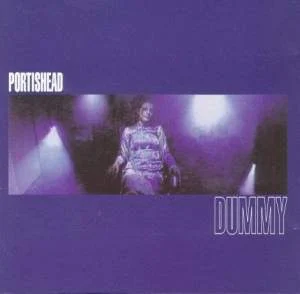Trip hop is no longer the dark, brooding little brother of hip-hop. Now in 2011, we can recognize the genre to the point where we don’t have to say things like “trip hop is hip-hop without the urban American lyrics and attitude,” or “it’s like hip-hop on acid.”
No, none of that.
We don’t even have to call it “spy music” anymore – even though I’d argue spy music is a pretty cool moniker.

While we still recognize the influence of hip-hop, dub, and jazz on the genre, nowadays we can immediately recognize trip hop for its own cool, surreal sensibilities.
Portishead’s Dummy is everything a great trip hop album should be: cool, dark, elegant and slightly demented.
Released in 1994, Dummy not only epitomizes what a great trip hop album should be, it set the rules.
Geoff Barrow, Beth Gibbons and Adrian Utley released their debut just as trip hop was in full bloom, winning the 1995 Mercury Music Award.
To put that in perspective, they beat out another massive debut released that awards cycle, Oasis’ Definitely Maybe.
Whether the judges knew they had a seminal album on their hands or whether they simply liked Dummy the most that year… we may never know. The fact of the matter is it’s hard to imagine what trip hop would look like without Dummy.
Dummy is the sound of a group of artists taking something they love (hip-hop) and making something new out of it (trip-hop) – the little brother taking stock of his older siblings’ talents and flaws, and stepping into his own.
In 1994 Barrow, Gibbons and Utley were still deeply impressed with American hip-hop. Musicians in and around Bristol, such as Massive Attack, began taking slow, downtempo hip-hop rhythms and sampling styles, and blending them with different aural textures, instruments and production techniques.
This is basically what Portishead did on Dummy, they just did it so well that they helped the subgenre they were working in become its own genre.
It’s not hard to hear the hip-hop in Dummy, as Barrow expertly places vinyl scratches and jarring dubs over slow grooving bass and drum beats throughout the album.
However, it’s the new textures that make Dummy essential in the transition from hip to trip. The group immediately makes clear their agenda with the opener “Mysterons,” which opens with melancholic guitars, vinyl scratches and an eerie, ghoulish synth line.
The hip-hop essentials are there, but it’s the new sounds that steal the show. When Gibbons slides in softly swooning “Inside your pretending /Crimes have been swept aside/Somewhere where they can forget” you know she isn’t talking about gang violence.
Portishead keeps up this format for pretty much the entire album, as each song experiments with different textures over the ever-present downtempo beats.
“Mysterons” unnerves you, but slowly you get lulled in.
One of the better-known tracks off of Dummy, “Sour Times” comes next.
If there were anything trip-hop missing from “Mysterons,” it would be a cinematic quality.
“Sour Times” delivers this, making you feel as if you’re in some Middle Eastern lounge where for some reason there’s a hip-hop drummer, your pager keeps making a weird noise and some white chick is crying “‘Cause nobody loves me/ It’s true…not like you.”
What makes the song, though, it’s Utley’s ubiquitous “spy” guitar- with this song he pretty much singlehandedly cements the sound to the genre.
The opening of “It Could Be Sweet” feels like a return to the hip-hop party… then Gibbons comes in exotically sighing, “I don’t wanna hurt you.” Sorry.
With “It Could Be Sweet” and the subsequent “Wandering Star,” Barrow writes the book on how to incorporate hyped horn hits into laid back grooves.
On “Roads” we see Portishead showcase their arrangement skills.
The layering is slow,organic and downright moving. It’s hard to screw up a song with violins and a beautiful voice like that of Gibbons, but it’s also hard to match what Portishead can do with these elements.
Arguably, Barrow, Gibbons and Utley are each at their most simple on “Roads,” but the end result is breathtaking.
“Roads” features the most basic beat on all of Dummy, a simple repeating guitar echo, and Gibbons at her best.
The way and pace Portishead utilizes each element, however, shows a maturity uncommon on a debut, especially in a blooming genre.
Another of the better-known songs, the album’s last track “Glory Box” features Gibbons at her creepiest.
When she sings, “Give me a reason to love you” it’s hard to tell whether she needs a reason to love you or cut you up.
“Glory Box” retains many of the cinematic qualities developed over the album, but has more soul, mainly due to Utley’s roaring guitar licks.
Barrow keeps it laid back with drums and a wandering strings arrangement. Near the end, the bottom drops out and is replaced by pounding drums and bass, Gibbons commanding, “It’s time to move over.”
Then they taunt you with the main groove at the end and you’re addicted.






